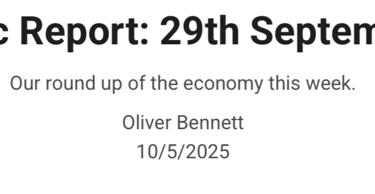Top 3 Economic Stories This Week
Energy Prices Rise Amid Supply Issues
Maintenance outages in Norway and tensions in the Middle East has led to an almost 9% increase in its price, as the brink of winter nears. Oil prices were also affected this week - with prices climing back above $88 a barrel. Analysts have raised concerns that this could have a damaging effect on inflation, if these rises in costs are sustained. This acts as a nightmare for the many central banks across the world and their efforts to combat inflation - it also worsens the struggles the Fed face in juggling unemployment with inflation as macroeconomic goals.
Potential Stabilisation in the UK Housing Market
This week nationwide data showed UK house prices had risen 0.2% in September. This shows positive signs as the first increase in four months, potentially signalling stabilisation after a year long slump for the UK housing market. Regarding the causation of the uptick, analysts pointed to the steady employment we are seeing in the UK at the moment, alongside mortgage rate cuts. The BoE's "Mortgage Market Review" displayed that Banks are lending about 20% less for mortgages than they were before the pandemic. This shows that UK lenders are being careful, acting as a positive sign for stabilising the UK housing market - as it suggests that banks are avoiding risky mortgage growth which has led to past housing bubbles, and this responsible borrowing will protect both banks and UK consumers/households from potential financial shocks.
WTO Data Projects Global Trade to Slow
Global trade could be seen to be in a bit of trouble as of the WTO's forecast. The WTO has cut this years global trade-growth forecast from 2.4% to 1.3%. This is a reflection of a contraction in European demand, and issues on the supply side - with disrupted shipping in the Red Sea. Economists have warned that the prolonged weaknesses in trade that the WTO forecast could widen the UK's current account deficit in 2025.
Policy Pulse: Energy Security (UK)
UK ministers met with energy suppliers this week, after the surge in gas prices mentioned above. They looked to discuss support for vulnerable households in the UK, as energy costs are hurting consumers. The Bank of England has mentioned the damaging effects of energy volatility on inflation projections, and as with other central banks around the world, we can predict will almost certainly delay further rate cuts if such energy volatility continues.
Industry Spotlight: Construction
Planning bottlenecks and increasing raw material costs remain key issues for homebuilders. However, those such as Barratt Developements and Persimmon (both FTSE 100 firms), have noted a small pickup in reservations this month, pointing towards growing revenue for the next few. Construction PMI showed further positive signs for the industry as it climbed to 50.4 from the previous months 48.9. This comes about due to public-sector infrastructure projects. The raw material costs mentioned earlier, do continue to weigh down smaller contractors as steel and cement prices have risen by 5% month on month. The issue is that those that don't pass this on to the consumer face the burden, damaging profits, but meanwhile those that do face restricted revenue as consumers turn them away due to such high prices caused by raw materials. Groups within the industry have urged the UK treasury to continue its Infrastructure Finance Guarantee Scheme to help smaller contractors throughout 2026.






Economic Analysis. Political Analysis. Insightful Analysis.
Explore political and economic affairs with us.
© 2025. All rights reserved.


